“In a world where AI is not just a buzzword but a game-changer, failing to leverage AI tools in sales is like bringing a knife to a gunfight. Read on to discover how you can arm your sales arsenal with AI’s cutting-edge technology.”
Have you ever found yourself wondering How can AI boost sales figures? Are there AI tools that can seamlessly integrate into my existing sales process? What are the real-world benefits of AI in sales? Steve Jobs once said, “Innovation distinguishes between a leader and a follower.” This article aims to transform you from a follower into a leader in the sales domain by harnessing the power of AI.
The problem of stagnating sales figures and inefficient sales processes is as old as the concept of trade itself. However, the advent of AI has introduced revolutionary solutions. Studies like Harvard Business Review’s analysis of AI in sales and Forbes’ insights on AI-driven sales strategies shed light on the transformative impact of AI in this field.
Why should you listen to what I have to say? With over a decade of experience in sales and technology, I’ve not only witnessed but also contributed to the evolution of sales strategies in the AI era. My journey includes leading sales teams to record-breaking performances and consulting for Fortune 500 companies on integrating AI into their sales processes.
By reading this article, you’ll be equipped with knowledge about the top AI tools for sales to revolutionize your revenue. You’ll understand how each tool fits into different aspects of the sales cycle, from lead generation to closing deals, and how they can be leveraged to boost your sales figures and efficiency.
| Name of Tool | Key Feature | Pricing | Target Audience |
| Flatlogic | AI-driven code generation, customizable templates | Tailored pricing | Businesses needing custom web apps |
| Salesforce Einstein | Predictive analytics, lead scoring | Additional cost on Salesforce subscription | Salesforce CRM users |
| HubSpot Sales Hub | Email tracking, sales automation | $50/user/month onwards | Small to medium businesses |
| Drift | AI chatbots, real-time interaction | Custom pricing | Businesses with active websites |
| Outreach | Sales sequence automation, analytics | Custom pricing | Sales teams of all sizes |
| Chorus.ai | Call recording and analysis, AI insights | Custom pricing | Sales teams focusing on calls |
| Zoho CRM | AI sales assistant, sales automation | $14 to $52/user/month | Small to medium businesses |
| Leadfeeder | Visitor identification, lead scoring | $63/month onwards | Businesses analyzing web traffic |
| Gong.io | Call recording and analysis, revenue intelligence | Custom pricing | Sales teams analyzing calls |
| LinkedIn Sales Navigator | Advanced search filters, lead recommendations | Around $80/user/month | B2B sales professionals |

How to Choose the Best AI Tools for Sales
When it comes to leveraging AI tools in your sales strategy, it’s crucial to cut through the noise and focus on what genuinely matters. The right tool can streamline your sales process, enhance efficiency, and boost your bottom line. But the wrong choice can be a costly distraction. Here are some no-nonsense, key factors to consider when selecting an AI tool for your sales team:
- Functionality Alignment: The tool should directly address your specific sales challenges, whether it’s improving lead qualification, automating follow-ups, or providing accurate sales forecasts.
- Ease of Integration: The AI tool must fit seamlessly into your existing tech ecosystem, particularly your CRM system, to avoid operational hiccups.
- User-Friendliness: The effectiveness of a tool is directly proportional to its usability. If your team finds it complicated, they’re less likely to use it to its full potential.
- Scalability: As your business grows, your AI tool should be able to handle the increased load and complexity without faltering.
- Customization: Every sales process has its unique aspects. The AI tool you choose should offer enough customization options to adapt to your specific needs.
- Technical Support: Even the best AI tools can encounter issues. Reliable customer support is crucial for resolving problems swiftly.
- Cost-Effectiveness: Evaluate the tool’s price against the actual value it brings to your sales operations. Avoid overpaying for unnecessary features.
- Security and Compliance: With data breaches on the rise, ensure the tool adheres to industry-standard security protocols and complies with relevant data privacy laws.
- Credible Reviews and Testimonials: Look for honest feedback from businesses similar in size or industry to yours. This can provide valuable insights into the tool’s real-world performance.
- Trial Periods: Always insist on a trial period. This hands-on experience is the best way to ascertain the tool’s fit for your organization.
Future of Sales: AI’s Role
As we stand at the intersection of technological innovation and sales strategy, it’s evident that AI is not just a trend but a fundamental shift in how sales are conducted. This section explores the potential future of sales in an AI-driven world, highlighting emerging trends and the evolving role of AI.
Predicting the Future with AI
In the future, AI will enable even more precise data analysis, allowing businesses to craft highly targeted sales strategies based on consumer behavior patterns, market trends, and economic forecasts. AI will advance to predict customer needs and market shifts with greater accuracy, allowing sales teams to be proactive rather than reactive.
AI-Powered Personalization at Scale
With AI, the future of sales will see hyper-personalized customer journeys, where every interaction is tailored to individual preferences and history. AI will enable real-time pricing adjustments based on market conditions, customer demand, and purchasing history, optimizing sales and profits.
Automation and Efficiency
AI will automate more complex sales tasks, reducing the time spent on administrative work and allowing sales reps to focus on building relationships and closing deals.
Advanced AI assistants will handle initial customer interactions, lead qualification, and even resolve common queries, providing a seamless customer experience.
Revolutionizing Lead Generation and Nurturing
Future AI tools will not only identify potential leads but also predict which leads are most likely to convert, and when, significantly improving the efficiency of the sales funnel.
AI systems will autonomously nurture leads through personalized content and timely follow-ups, ensuring no opportunity slips through the cracks.
Ethical AI and Trust
As AI becomes more integrated into sales, ethical use of AI and transparency in how customer data is used will be crucial in building and maintaining consumer trust. AI tools will need to adapt to evolving regulations around data privacy and consumer protection, ensuring ethical and legal compliance.
The future of sales with AI holds immense potential, marked by a shift towards more personalized, efficient, and data-driven approaches. As AI technology continues to evolve, it promises to not only refine current sales processes but also unlock new possibilities and opportunities in the sales domain. For businesses, staying abreast of these developments and incorporating AI into their sales strategies will be key to gaining a competitive edge in the ever-evolving marketplace.
Best 10 +AI Tools for Sales
Staying ahead of the curve isn’t just a goal-it’s a necessity in the high-stakes world of sales. The advent of AI in sales has been nothing short of a revolution. From automating mundane tasks to providing deep insights into customer behavior, AI tools are redefining the way sales is done. Let’s take a look at the best AI tools that are changing the sales landscape and how they can help you maximize your revenue.
Flatlogic
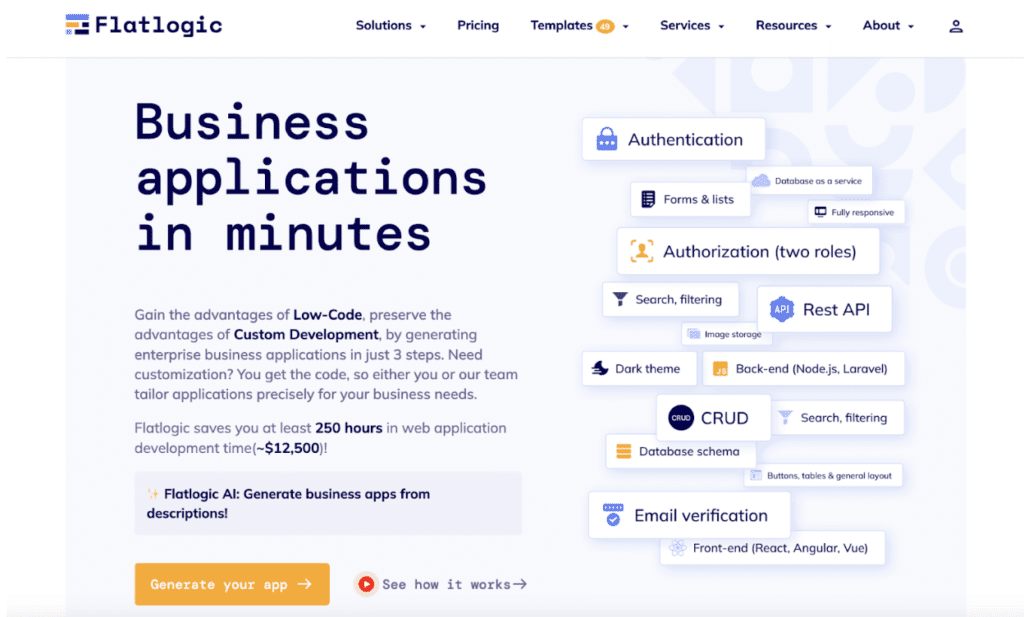
Flatlogic, with its innovative Flatlogic Generator, offers a unique AI-driven solution for e-commerce. This tool is designed to rapidly develop web applications through a blend of AI and user input. It’s particularly effective for creating ERP, CRM, CMS, and admin panels, tailored to the specific needs of e-commerce businesses.
Key Features: AI-driven code generation, customizable templates, scalability without sweat, and universal deployability.
Pricing Model: Tailored pricing based on project scope and customization needs.
Pros: Full code ownership, highly customizable, no scalability issues.
Cons: May require technical know-how to fully leverage, possibly higher upfront cost compared to off-the-shelf solutions.
Salesforce Einstein
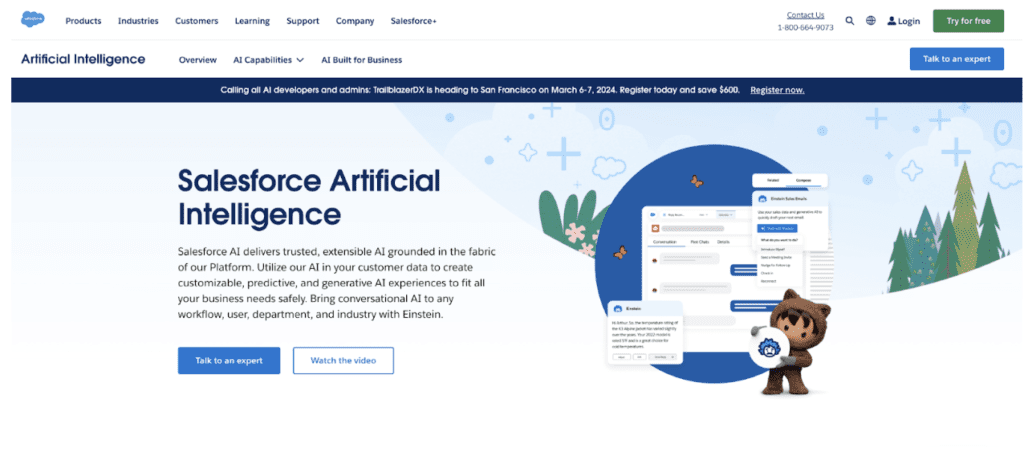
Einstein is an AI layer integrated into the Salesforce platform, enhancing CRM with smart features. It uses data from Salesforce to predict trends, recommend actions, and automate routine tasks. It’s particularly useful for sales predictions, customer insights, and automated marketing strategies.
Key Features: Predictive analytics, lead scoring, automated data capture, AI-driven insights.
Pricing Model: Additional cost on top of Salesforce subscriptions, price varies based on requirements.
Pros: Seamless integration with Salesforce, robust AI capabilities.
Cons: Expensive, and complex for small businesses.
HubSpot Sales Hub
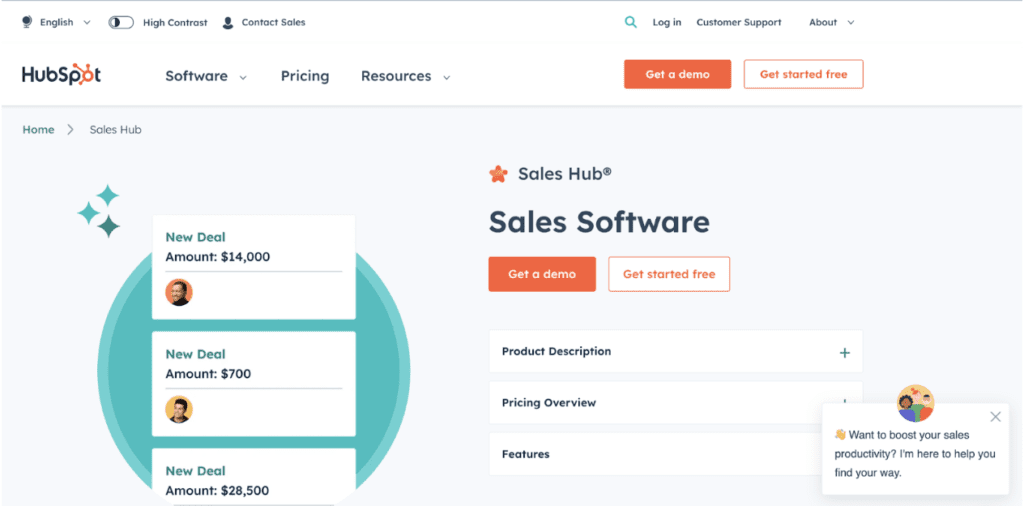
HubSpot Sales Hub uses AI to streamline the sales process. It helps with lead scoring, automates email outreach, and provides valuable insights into customer behavior to help sales teams strategize more effectively.
Key Features: Email tracking, sales automation, pipeline management, performance analytics.
Pricing Model: Freemium model; paid plans start at $50/user/month.
Pros: User-friendly, excellent integration options, comprehensive free plan.
Cons: Can get pricey as you scale, with limited customization.
Drift

Drift is an AI-powered chatbot platform focused on conversational marketing and sales. Drift’s AI chatbots interact with visitors in real time, capturing leads and booking meetings.
Key Features: AI chatbots, real-time visitor interaction, meeting scheduling.
Pricing Model: Pricing is not publicly disclosed; customized based on business needs.
Pros: Enhances website engagement, and captures leads effectively.
Cons: Pricing transparency issues, can be overkill for smaller businesses.
Outreach
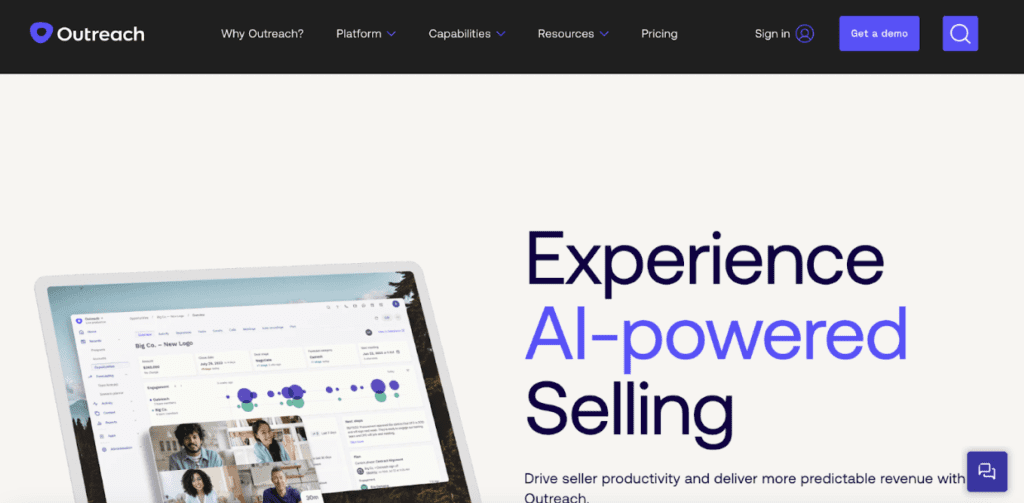
Outreach is a sales engagement platform that streamlines customer interactions. It automates and organizes all touchpoints throughout the sales process.
Key Features: Sales sequence automation, email and call tracking, analytics.
Pricing Model: Custom pricing based on the size and needs of the sales team.
Pros: Streamlines sales process, good integration options.
Cons: Learning curve for full utilization, pricing can be steep.
Chorus.ai
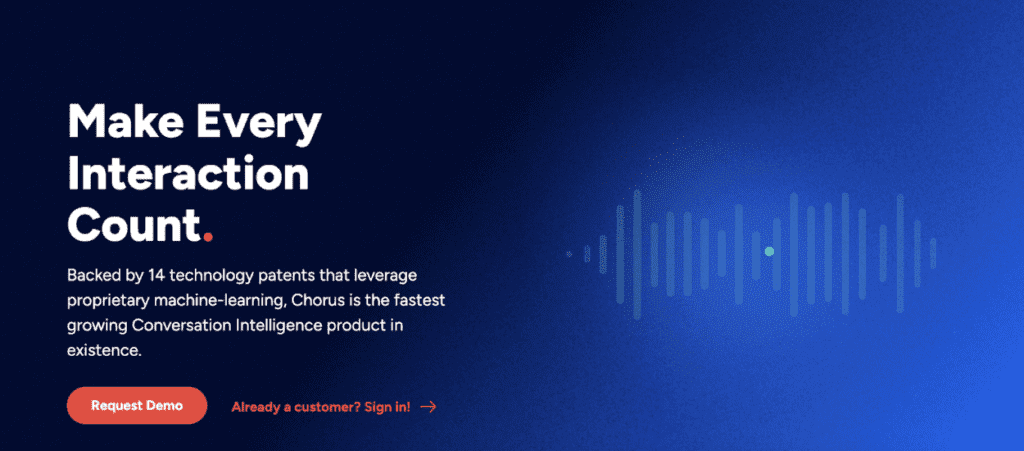
Chorus.ai is a conversation intelligence tool that records, transcribes, and analyzes sales calls. Chorus.ai provides actionable insights to close deals more effectively.
Key Features: Call recording and analysis, AI-driven insights, deal-risk scoring.
Pricing Model: Custom pricing based on team size and feature requirements.
Pros: Deep insights into sales calls, help improve sales tactics.
Cons: Privacy concerns for recorded calls, can be costly.
Zoho CRM
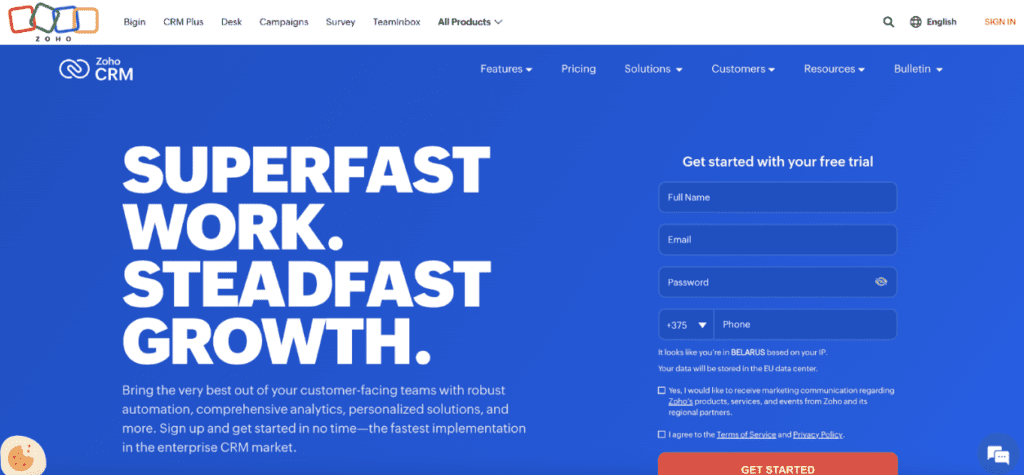
Zoho CRM incorporates an AI assistant named Zia, designed to predict optimal times for contacting leads and streamline routine tasks. The platform’s primary attributes include an AI-powered sales assistant, sales process automation, and comprehensive performance analytics.
Key Features: AI sales assistant, sales automation, performance analytics.
Pricing Model: Ranges from $14/user/month to $52/user/month.
Pros: Affordable, versatile, and good for small to medium-sized businesses.
Cons: Can be less intuitive, limited third-party integrations.
Leadfeeder
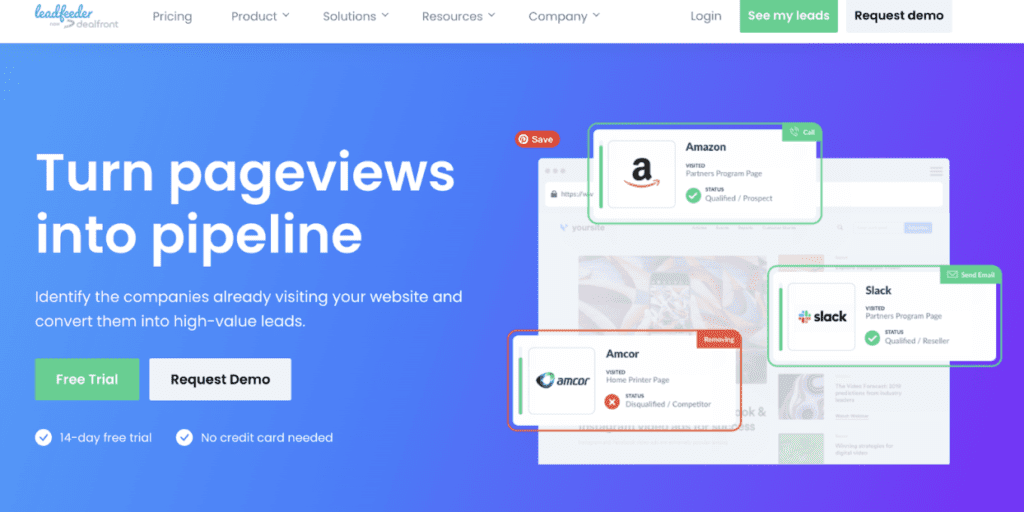
Leadfeeder functions as an advanced digital tracker, meticulously monitoring website visitors and collating data on prospective leads and their interactions on your website. Its key features encompass visitor identification, lead scoring, and seamless CRM integration.
Key Features: Visitor identification, lead scoring, CRM integration.
Pricing Model: Free lite version; paid plans start at $63/month.
Pros: Easy to set up, good lead insights.
Cons: Limited details in the lite version, higher tiers can be expensive.
Gong.io
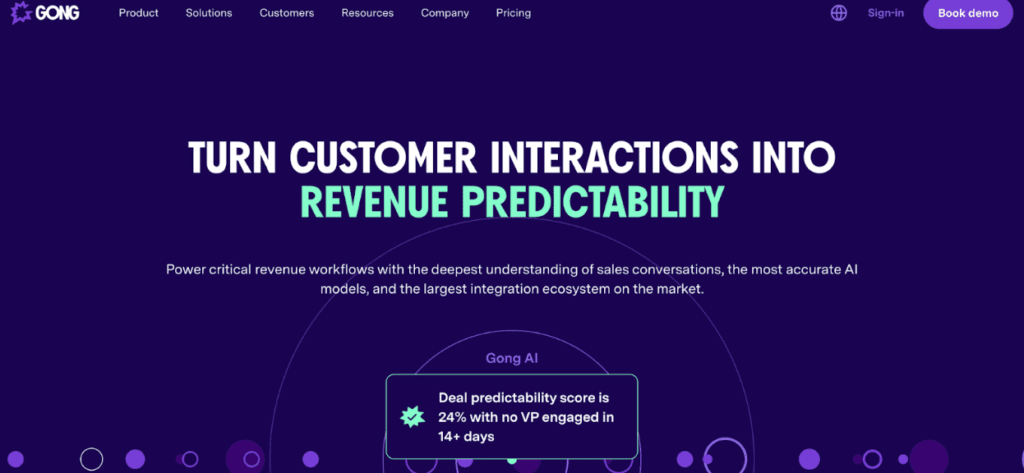
Gong.io, akin to Chorus.ai, specializes in the analysis of sales calls to furnish detailed insights on customer engagements, thereby enhancing sales strategies. Its core features include call recording and analysis, AI-driven insights, and revenue intelligence.
Key Features: Call recording and analysis, AI-driven insights, revenue intelligence.
Pricing Model: Custom pricing based on the size of the sales team and the features needed.
Pros: Valuable insights into customer interactions, helps in coaching sales teams.
Cons: Privacy considerations, relatively high cost.
LinkedIn Sales Navigator
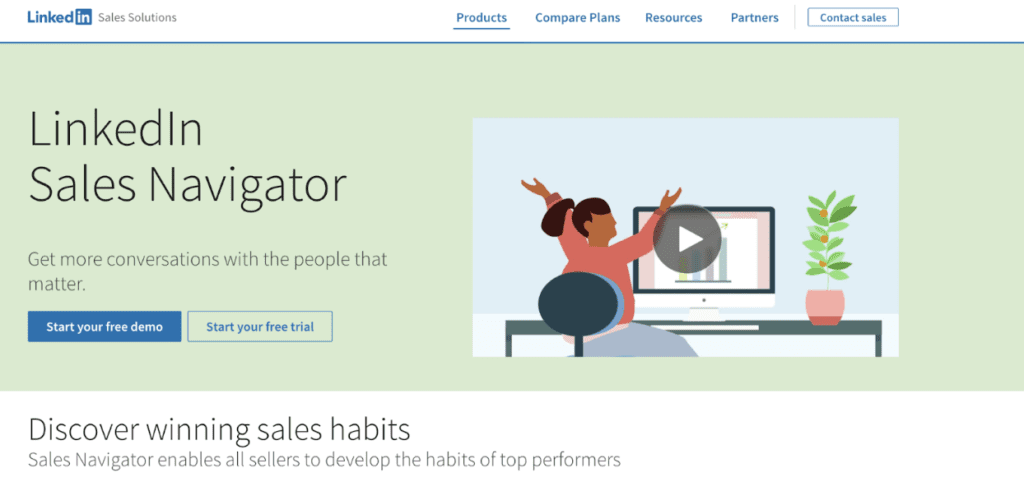
LinkedIn Sales Navigator stands as LinkedIn’s advanced tool for sales professionals, offering sophisticated search capabilities and AI-based lead recommendations. It features advanced search filters, lead recommendations, and InMail messaging.
Key Features: Advanced search filters, lead recommendations, InMail messaging.
Pricing Model: Starts at around $80/user/month.
Pros: Access to LinkedIn’s vast professional network, great for B2B sales.
Cons: Costly for individuals or small teams, limited utility outside B2B.
Summing Up
In conclusion, integrating AI into sales is an opportunity that no forward-thinking company can afford to miss. It’s not just about staying competitive, it’s about redefining what’s possible in sales. As we move forward, the synergy of AI and sales will undoubtedly open new horizons of efficiency, effectiveness, and growth. Now is the time to arm your sales arsenal with AI and move from being a follower to a leader in sales.
In the article, I explored the transformative role of AI in sales and how AI tools like Flatlogic Generator, Salesforce Einstein, and HubSpot Sales Hub are revolutionizing the field. Through real-world case studies and success stories from leading companies, the article highlighted the practical benefits of AI in sales, from improved lead generation and customer engagement to streamlined sales processes and predictive analytics. I also looked ahead, considering the future potential of AI in sales and the importance of ethical AI practices.
For a straightforward approach to integrating AI into your sales strategy, take a look at Flatlogic’s offerings. Utilize tools like the Flatlogic Generator for straightforward, effective solutions in creating custom web applications and automating key processes. These tools can provide the insights needed to enhance your sales and increase revenue. Reach out to Flatlogic to explore how AI can pragmatically upgrade your sales tactics.

Comments